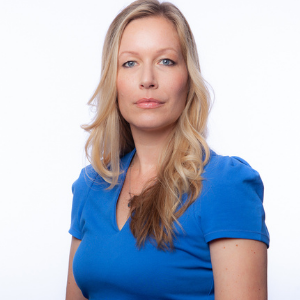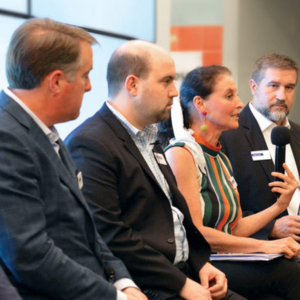Alison Taylor: Investment Vice President, PGIM Real Estate
 “The best leaders I’ve seen have always made time for people – regardless of level and the topic of conversation,” says Alison Taylor.
“The best leaders I’ve seen have always made time for people – regardless of level and the topic of conversation,” says Alison Taylor.
Taylor joined PGIM Real Estate after graduating from the McIntire School of Commerce at the University of Virginia. She had an initial introduction to real estate through prior internships and coursework but found a home at PGIM, and she has grown within the company into a leadership role.
“The longer I worked here and the more I learned, the more interesting real estate became – especially the debt side,” says Taylor. “It surprises me how much I continue to enjoy and feel challenged by the work and the opportunities that have been afforded to me here at PGIM.”
Continuing to Learn Each Day
“No day and no deal are the same,” says Taylor. “Each day presents a different challenge, and I can truly say that I learn something new every single day.”
She loves the variety of her days, which has progressed by the shifting office dynamics during and following the pandemic. As a self-starter, Taylor works independently, pacing herself towards deadlines, which serves in her multi-faceted role. “I have a lot of different responsibilities and work cross-functionally with people across the business, but I’m able to keep on track, juggle a bunch of things and know what needs to be placed on the back burner.”
Taylor feels she brings realness to the table, but she proves that it doesn’t have to hit hard – that people can assert their own opinions while valuing others’.
“I’m very to the point, but not in an aggressive manner. When I was working on the originations side of the business, I was able to pass on a deal or let someone down nicely, but they would still walk away feeling good about themselves,” she says.
Lessons Learned Growing into a Leadership Role
As someone who was driven to grow into a leadership role, Ali shared several tips to help achieve the next level – and beyond – of her career, despite what tensions and challenges she faced.
- Balance Approachability with Authority
In her ever-evolving role, Taylor notes that being approachable is not only important in showcasing her desire to learn and take on more responsibilities to senior leaders – but it is also important in demonstrating the importance of quality work and strong leadership attributes to her junior team members.
“There can be a double-edged sword as I weave my personal stories into my professional relationships, so I can build and continue to maintain them. I have this ability to connect with younger colleagues who may view me more as a friend while still being able to be taken seriously,” she says. “You need to strike a balance of approachability and authority, so that when we’re actually working on projects and dealing with teams, everyone sees that this is business. I expect very high-quality work and sometimes, we’ll be working late. But I’ll be there right alongside my colleagues.”
Currently, Taylor sees herself straddling the line between taking on the responsibility of seniority and still actually doing the work to show more junior members how it’s done and what’s expected.
“It can be a weird limbo state, where you’re not quite the final decision-maker, but you’re experienced enough to know what will drive successful outcomes for the company,” she says. “That can be a challenge day-to-day.”
- Own Boundaries and Your Availability
As she has risen through the ranks, Taylor has started to learn the art of delegation and saying ‘no.’
“When you’re junior and hungry, you work late, so you can take it all on. However, I think it serves your growth to start setting boundaries as you advance. I don’t have children yet, but I am still going to sign off at a reasonable time and have a nice dinner with my husband,” she says. “You need to set boundaries, and sometimes, it means saying no or that you’ll look into something at a later time – as your schedule and workload permits.”
She notes this is especially important after working remotely during the pandemic, which created an expectation of 24/7 availability.
“It’s important to not always be accessible via setting clear boundaries, such as calendar blocks and/or letting colleagues know you’ll get back to them,” she says. “Once you’ve reached a certain point, where people know you are responsive and trustworthy, you can put those boundaries in place, and there’s something powerful about that.”
- Find Power in the Pause
Recently, Taylor received the feedback that she needs to work on being too responsive. Rather than going with her gut reaction to respond immediately, she was advised that, ‘Sometimes, you need to sit on things to let both parties think. Once you have, you’ll come to a better conclusion.’
Receiving that advice was somewhat liberating, as Taylor has realized some matters work themselves out over a walk or a ponder, without needing immediate response or engagement. Plus, she notes her initial gut response is not always the most thoughtful or comprehensive.
Leading with Connection and Collaboration
“Everyone talks about how male-dominated commercial real estate is, but I feel like I’ve worked at a company with better gender balance and that helps grow and support female leaders, which has been amazing,” says Taylor. She has been shown that it’s okay to leave work for a priority at home or family activity to attend to.
“The best leaders I’ve seen have always made time for people – regardless of level and the topic of conversation,” she says. “When meeting with senior leaders, I feel like they’ve given me their undivided attention, which shows me they care and want to help me learn and succeed.”
In fact, even though she often finds herself in back-to-back meetings, Taylor makes relationship-building one of her top priorities, dedicating time to foster connections – no matter the workload.
When it comes to the PGIM work culture, she enjoys being surrounded by smart people who are willing to put in the work to get the job done, while also respecting personal boundaries and valuing work-life balance.
“The structure is not very hierarchical in that everyone is very accessible up to the MD level. For being within a Fortune 500 company, it feels like a lean entrepreneurial structure,” she observes. “Everyone is trying to advance our initiatives and share information, so it’s a very collaborative environment. It fits well with my personality, which is probably why I’ve been here for more than a decade.”
Acting As a Chameleon – Leveraging Her Strength of Adaptability
When thrown into new situations, Taylor remembers what a previous manager told her – that she adapts well to a new environment because not only does she take her responsibilities very seriously and make intelligent decisions, but she also knows when she needs to ask for help. Although some may find asking for help to be a weakness, it’s something Taylor considers to be a strength, enabling her to better understand her work or situation she is facing.
In her career thus far, the ability to assess and adapt to situations has enabled her not to stress the small stuff as much. She admits that it used to bother her if she wasn’t invited to a property tour or closing dinner after a deal she’d worked hard on, but after a few years, she realized that more than enough invitations will come along – so there’s no need to covet them.
“At a certain point in your career, you’re being asked to travel to this and that. You’ll have too many things to attend and will be pulled in different directions,” she says. “It’s a thirty- or forty-year career, so you don’t have to do it all within your first couple years. Just put your head down, do the work and form those relationships because it’s a small sector and everyone’s paths cross again.”
Be Yourself, Everywhere
When it comes to looking ahead, Taylor aspires to continue rising into leadership roles and gain more people-management experience. She also hopes to continue doing the things she loves, such as traveling to new places, curling up with a good book (her most recent read is Rules of Civility, after reading A Gentleman in Moscow by the same author) and working out – all activities that she attributes to keeping her mental health strong.
She loves traveling and planning international trips and visited Dubai and the Maldives in January for her own honeymoon.
Morning workouts are an important part of her routine to maintain balance, and she especially enjoys boxing as an energy outlet.
Taylor once heard that the most successful people are the same exact selves in their personal lives as professional lives.
“You don’t have to come in like a professional bulldog and run the show if that’s not really your personality. You can still be successful,” she says. “The mentors that have most inspired me blend both worlds and stay true to themselves.”
By Aimee Hansen










